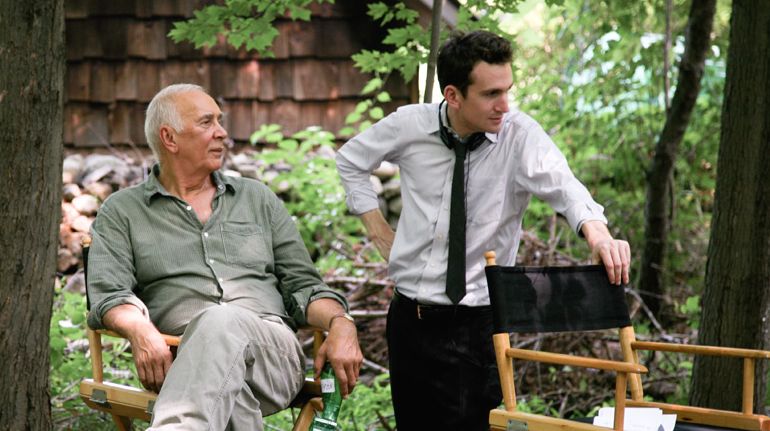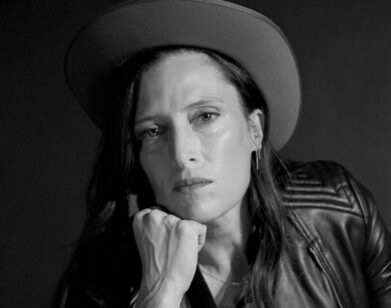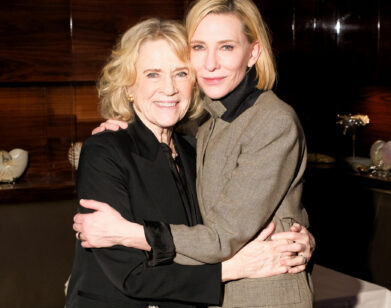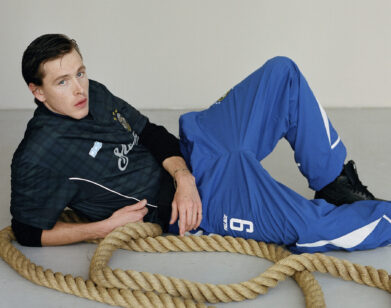The Future According to Jake Schreier

ABOVE: FRANK LANGELLA AND JAKE SCHREIER ON THE SET OF ROBOT & FRANK.
Robot & Frank does not seem like a directorial debut; few first-time directors manage to assemble a cast as impressive as Frank Langella, Susan Sarandon, Peter Sarsgaard, Liv Tyler, and James Marsden. Before Robot & Frank, however, director Jake Schreier focused on music videos—for his friend Francis and the Lights—and shorts, often in collaboration with his film group, Waverly Films. Already a hit with critics and at Sundance (Schreier was awarded the Alfred P. Sloan Feature Film Prize), the film is coming to cinemas this week, and Schreier is in a good mood. Why wouldn’t he be?
If the word “robot” immediately conjures up visions of I, Robot, or Steven Spielberg’s A.I., rest assured that Robot & Frank is no sci-fi tribute to Isaac Asimov. Describing Schreier’s film is much more difficult than that. Set in the near future, Frank (played by Langella) is a retired, moderately curmudgeonly jewel thief and a constant source of frustration for his son, Hunter (Marsden) and absent daughter, Madison (Tyler). Frank’s forgetful, and it is increasingly problematic. Fed up with trying to monitor his father, Hunter buys Frank a care-taking robot. Were you to watch the movie with five friends, you would come out with five different opinions about what the film is “about”: dementia and our aging population, familial responsibilities, art, addiction, loneliness and the human tendency to anthropomorphize, and, of course, the role of machinery in the mundane.
Interview recently sat down with Schreier to quiz him about his film, working with friends, upscale jewel thieves, and what’s next.
EMMA BROWN: Robot & Frank has a pretty impressive cast, especially given that it’s your first film.
JAKE SCHREIER: We were lucky to have them. The whole thing is surreal. The first day, just when you have Frank Langella and Susan Sarandon acting in front of you, I forgot to direct—”Oh yeah, that was great, I guess, do it again”—I was like, “Oh, I should probably do my job at some point.” You just kind of get out of the way.
BROWN: How did you pick Peter Sarsgaard for the voice of the robot?
SCHREIER: I think his kids went to school with one of my producers’ kids, but I’ve been a big fan of his for a long time, since Shattered Glass. I think if you were programming a robot to take care of the elderly, you would want them to have kind of a calm, soothing, and caring voice—those qualities are just so endemic to his voice, it seemed that even if we made it monotone or we made it sound like a robot, they would still be there. There’s just such a level of empathy in it.
BROWN: I like the height of the robot. It’s like a child. How did you decide that? Did you have extensive conversations about what the robot would look like?
SCHREIER: We had some extensive conversations, but at the same time, it comes from a real place. We basically wanted it to be as short as it could be so that it could be cute, but still able to reach a shelf. Just under five feet, or four and a half. Somewhere around there. It helps that Frank [Langella] is tall—it seems even shorter.
What we tried to do is design the robot [with] a “less is more” philosophy. It was always very important that it be faceless. Humans will ascribe emotion to a toaster; we’re so good at that, we like to talk about everything as though it’s real. If [the robot] is faceless, in the beginning, hopefully you find it a little bit creepy. Then as Frank grows to care about it, hopefully the audience goes on the same journey.
BROWN: Did Peter and Frank ever interact in person?
SCHREIER: Not at all, no. We didn’t even know it was going to be [Peter] when we were shooting. He came in, and in eight hours we recorded the entire robot voice. We didn’t have him watch the movie, really—he had seen it, but we just printed all the lines on a list and he read them through, because it was almost easier to disassociate them from the interaction in the film and make it sound more robotic. I think everything that ended up in the movie came from one half-hour readthrough of takes.
BROWN: That’s got to have been difficult for Frank. Were you reading the lines out loud, and was it just pause?
SCHREIER: His nephew was off camera, he was a PA on set and he would read the lines for the robot. And Frank is so good, he can do it with whatever.
BROWN: I heard that the film is actually based on a short you did a while ago, is that true?
SCHREIER: It is, yeah. Chris Ford, who wrote it, he and I went to NYU together, and his thesis film was a short version of the movie. We put it away, and four years ago we were looking for something to sort of develop as a feature, we thought, “Oh, that might be cool,” there might be something in it that is achievable on an indie scale but that also had a hook and could be relatable.
BROWN: Did you work with him on the short?
SCHREIER: I was the producer of the short, which meant that we shot at my uncle’s house in upstate New York. That was my main involvement. He and I and a bunch of other friends of mine from NYU, we’ve kept working together since school on various different things. [Ford] writes for my friends as well, but we were always looking for something to do together.
BROWN: Was the character of Frank always called Frank?
SCHREIER: It was, yeah. [Frank Langella] never asked us to change it and we sort of just went with it. But, yeah, it’s a funny coincidence.
BROWN: There’s also a character called “Jake” . . .
SCHREIER: Oh, Ford likes to name all his villains after me just to give me a hard time, so there will be more of those, unfortunately. I can’t do anything about it.
BROWN: Liv Tyler’s character objects to “robot labor,” and I assumed that she was going to talk about exploiting robots, but you never went that route.
SCHREIER: In our movie the robot’s pretty cute and hopefully, if the movie works, you come to care about it and you’re kind of pro-robot, and a lot of people leave the movie being like, “I want one.” But certainly going in, some people have concerns about what it means to leave our responsibilities to robots. I think to some degree in every family, you’ve got siblings who disagree over the care for their parents. James [Marsden] is the one that gives [his dad] the robot because he’s trying to make the best out of a bad situation. Liv [Tyler], who is actually doing very little to take care of her father, is the one who has these idealistic ideas about, “No, no, no. Humans have to take care of humans,” even though she is not living up to her own responsibility of doing that. It’s sort of like a future hippie philosophy: this is not something that should be left to machines. Humans should do this.
BROWN: You mentioned that you and Chris did some research together for the film.
SCHREIER: We did research on robots, [but] the most fun was to research jewel thieves. When you read about those guys —really high-class jewel thieves, ones that pull off these big heists—they talk about their work like artists.They’re not doing it for the money, because you really can’t spend it, if you’re stealing famous jewels, they’re hard to spend, so the heists are like these little art projects for them. It’s all about proving what they can do; they love it in the same way that an artist does. So that was sort of fun. It’s buried in the movie, and I don’t know if many people would pick up on it, but for me it’s sort of about how being an artist can screw up your relationships—what that did to Frank’s family. I think that’s something that most people that try to do this stuff can relate to, how hard it is to kind of juggle that passion for the craft while trying to maintain real relationships with people.
BROWN: But is that art, or addiction?
SCHREIER: Right, that’s a good question that I probably don’t want to answer. It’s better to think about.
BROWN: What is the strangest question you’ve been asked about this film?
SCHREIER: I think that someone asked, “What would [you] do if [your] kids got [you] a robot?” I still haven’t figured it out. I feel like I would want one. It seems like a good trade-off.
BROWN: Have your parents said anything? Are they nervous that you’ll try and abandon them in the care of a robot when they’re older?
SCHREIER: You know, I haven’t asked them that. That’s an even better question. I don’t know that robots are going to be ready in time for my parents. I’ll have to do it the old-fashioned way.
BROWN: I wanted to ask you about Francis and the Lights. I know that Francis did the music for the film; did he go to college with you as well?
SCHREIER: We’ve actually known each other since we were 13. I played in the band for a couple of years, though I’m not a very good keyboard player. He made music for some of my movies in college, and I did his music videos. We always thought it would be fun to kind of work together. He had never made a whole movie score, and neither had I—[so] it was really fun to kind of figure it out together. We watched a bunch of old Coen brothers movies and figured out themes. Matt Veligdan, it should be noted, orchestrated and arranged all of [the music] and did a great job of turning it into a real orchestral, filmic piece.
BROWN: Are you sick of talking about Robot & Frank yet?
SCHREIER: No. Maybe I just love the sound of my own voice too much. No, it’s kind of crazy, what’s happening now because it all feels like a sprint. You don’t stop. It doesn’t feel that long ago [that] we were just about to make it. To all the sudden be here and have it come out in theaters is just exciting.
BROWN: What are you up to now?
SCHREIER: Mostly just releasing this. There are a couple little things that are in early development, but there’s no next thing that I’m jumping into.
ROBOT & FRANK COMES OUT THIS FRIDAY, AUGUST 17.






